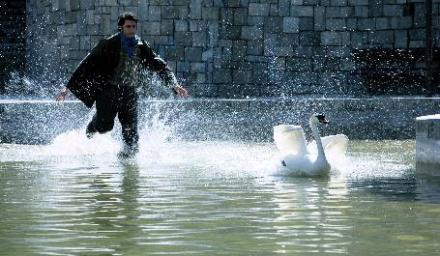
When we talk about freedom, the definition is merely a state of being between mind, body and spirit. This highly praised concept is the space we create between all three dimensions of our lives in order to experience absolute freedom, if we ever do. Where we live on this planet can make a difference in practicing our physical and intellectual freedom and how far we go to reach that state of being, is something personal and yet highly dependent on our country of residence.
For a Moment Freedom (Arash T. Riahi, 2010) portrays the heartbreaking story of Iranian and Kurdish refugees, who cross the Iran-Turkey border in extremely dangerous and harsh situations to seek political and social asylum in Europe. Just talking about the subject in twenty-five words or less gives us a clear sense of the movie. Just as we know what a seven magnitude earthquake can do to a poor developing country without even seeing any videos from the disaster, we can easily guess what a day could be like for a family with children crossing the border illegally on horses in winter. We hear these stories all the time, because they happen everyday, everywhere in the world. It seems utterly disturbing to see lives shattered in the twenty-first century because of our intolerance and prejudice towards one another.
For a Moment Freedom tells the story of three groups of heroes, a communist family with a son, two young hip friends with their cousin’s two children, and a simple Kurdish man and an Iranian man, who become good friends after living in Turkey for too long. They all reside at a rundown hotel in the ghettos of Ankara. They share the same daily schedule: going to the UN headquarter, standing in the line for 8 hours to talk to someone in charge and being told to go back home and come back the next day. They all share the same goal: finding asylum in Germany or Austria. They all share the same fear: being rejected by either one of the embassies, or worse than that, being caught by the Iranian secret police and deported back to Iran. They all live in the same hostile limbo full of humility, racism, and terror, and their only hope is freedom, sometimes at any cost. The beautiful parallel between these three stories build the tension towards the climax, where the inevitable does happen, but with the right twist, message and level of satisfaction at the end.
Manu, the Kurdish-Iranian character played by Fares Fares, is the character that stood out the most to me. He is a dreamer and always sees life as a glass half full. He has faith in himself and life, even when things get as dark as a prison cell. He believes in the power of visualization and imagines himself with a brand new Mercedes, eating poultry everyday, and living in a nice house with a beautiful woman. He tells his family about this glamorous lifestyle so they won’t worry about him. His Iranian friend Abbas, played by Said Oveisi calls him a liar for not telling the truth to his family. But Manu is too kind to break his family’s heart by telling them about his miserable life in Turkey. “Who knows, maybe one day all my lies become truth.” Manu tells Abbas, as Abbas laughs at his way of thinking. One character looks forward and chooses life, and the other chooses otherwise. From a very broad perspective, they both want freedom, one through life, and the other through leaving this life.
I am an immigrant in the United States and the reason I am here is because I did not find the freedom I wanted in Iran. Despite the difficulties of immigration, I did not go through anything even close to what these characters went through. I am grateful to my life and feel overwhelmingly blessed to be alive with this body and soul. In spite of my immediate freedom that America offers me, I am still struggling to find freedom to its fullest potential. My fight for freedom is no longer freedom of speech or expression, but it is “freedom from the known” as Krishnamurti calls it; it is freedom from attachments as the Buddha teaches, and it is being free from all fears so I can be fully conscious and celebrate life every moment.
Moment for Freedom is indeed this moment and perhaps if all lies become truth and we practice freedom of expression and live a comfortable life without any sensible socio-political turmoil, just like the movie, this journey won’t end with Mercedes-Benz and romance in Paris. It is best described as an on-going process, and we all start somewhere, if we choose.






